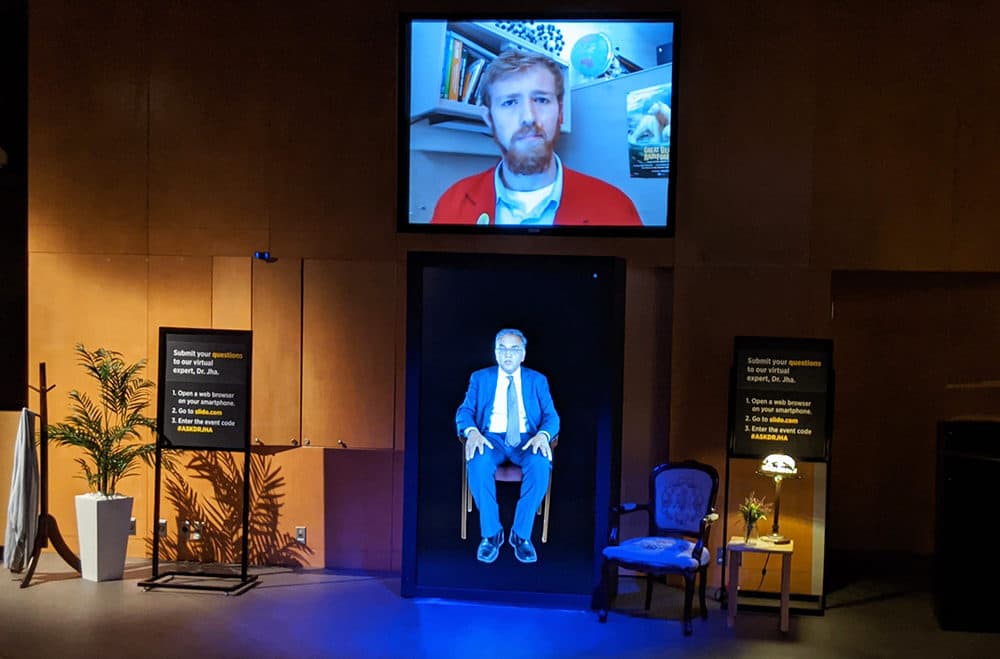Advertisement
Despite Rapidly Evolving Information, Boston Museum Of Science Launches COVID-19 Exhibits
Resume
Boston's Museum of Science is now incorporating innovative COVID-19 exhibits throughout its galleries — despite the challenges of how quickly information about the coronavirus changes.
The museum first launched programming on COVID-19 in February and gathered the community for a town hall conversation on March 8, says President Tim Ritchie. Days later, the virus forced the museum to shut its doors to visitors.
Coronavirus programming continued online through classes that allowed people to ask scientists questions or its #MOSAtHome resources. This helped the museum staff develop the information in the exhibits, which are on display now that the doors have reopened, he says.
To keep the exhibit up to date, the museum is leveraging the scientists and doctors living in Boston, such as Dr. Ashish Jha, a practicing physician and epidemiologist at Harvard University who was recently appointed dean of Brown University School of Public Health.
“We reached out to him months ago to learn about what's happening,” says Christine Reich, who specializes in exhibit development and conservation. “And we realized that one of the best things we could do was provide our public with the opportunity to have one-on-one interactions with Dr. Ashish Jha.”
A virtual Jha sits on a big screen in a small theater at the museum. A museum staffer relays questions that visitors submit on an app.
After asking Jha to serve as virtual scientist in residence, the museum then partnered with a group called StoryFile to utilize its artificial intelligence engine. Jha has responded to more than 550 questions over two days on video, she says.
When one visitor asked about mutations, Jha responded, “Most of the common mutations are not going to have any effect on people getting reinfected. There is a theoretical possibility that the mutation can be so severe that people can be reinfected or the vaccine we develop may not be effective, but I think that's extremely unlikely.”
In the Provocative Question experience, visitors sit across from each other at a kiosk and make decisions. The current question asked to visitors is: Should Massachusetts residents be required to share their location data with local health authorities to help stop the spread of COVID-19?
After one mother and daughter chose that individuals should be allowed to opt-in or out, the kiosk presented research from different studies meant to prompt reflection on their choice.
Compared to other areas in the U.K., a contact tracing app downloaded by 38% of the population of the Isle of Wight significantly decreased the spread of COVID-19, the kiosk said.
“What we found is that when we present our visitors with this framework and they can think about their social values and they can think about the scientific evidence,” Reich says, “they're actually more likely to use the scientific evidence for their decision making.”
The museum’s Future Of Health gallery displays an interactive COVID-19 map with colored squares representing the number of reported cases. The screens show coronavirus cases multiplying and piling up across the U.S.
The map is directly connected to COVID-19 tracking data from Boston Children’s Hospital, she says. As the pandemic spreads or slows, the map reflects the differences in transmission rates.
With information about the virus changing daily, Ritchie says the museum piggybacks on the School of Public Health and the local medical community.
Visitors want to know about the coronavirus, where it originated and how it’s transmitted, Reich says. And people also look to science for a sense of hope.
“It's been really heartwarming to watch families interact with some of these exhibits,” she says. “I saw mom as she was putting hand sanitizer on her 5-year-old, reading a label to that 5-year-old around all the different efforts that are taking place in science right now to create a better future.”
While science is in the limelight right now because of COVID-19, this important branch of study is also under attack. For Ritchie, he’s never seen science become so public and participatory — but also divisive.
Instead, he believes science should unite people during this time. The race for a vaccine, for example, started with China’s decision to quickly make a coronavirus genome available to scientists around the world.
“This is a great story that somehow has gotten a negative tinge to it,” he says. “And we're going to do everything we can to say, no, this is the human moment to rise up, to engage rather than to retreat.”
Karyn Miller-Medzon produced and edited this interview for broadcast with Tinku Ray. Allison Hagan adapted it for the web.
This segment aired on August 18, 2020.

